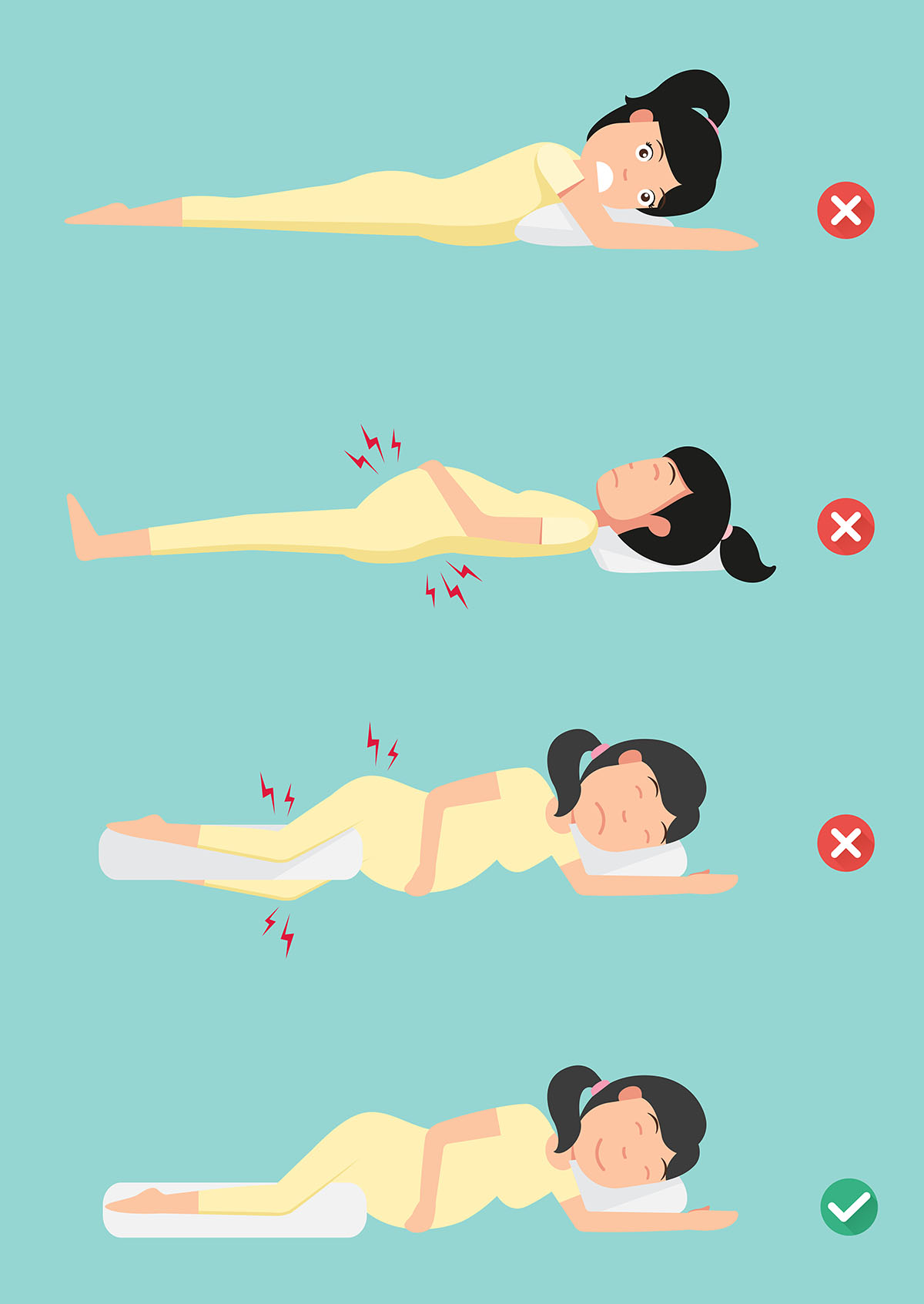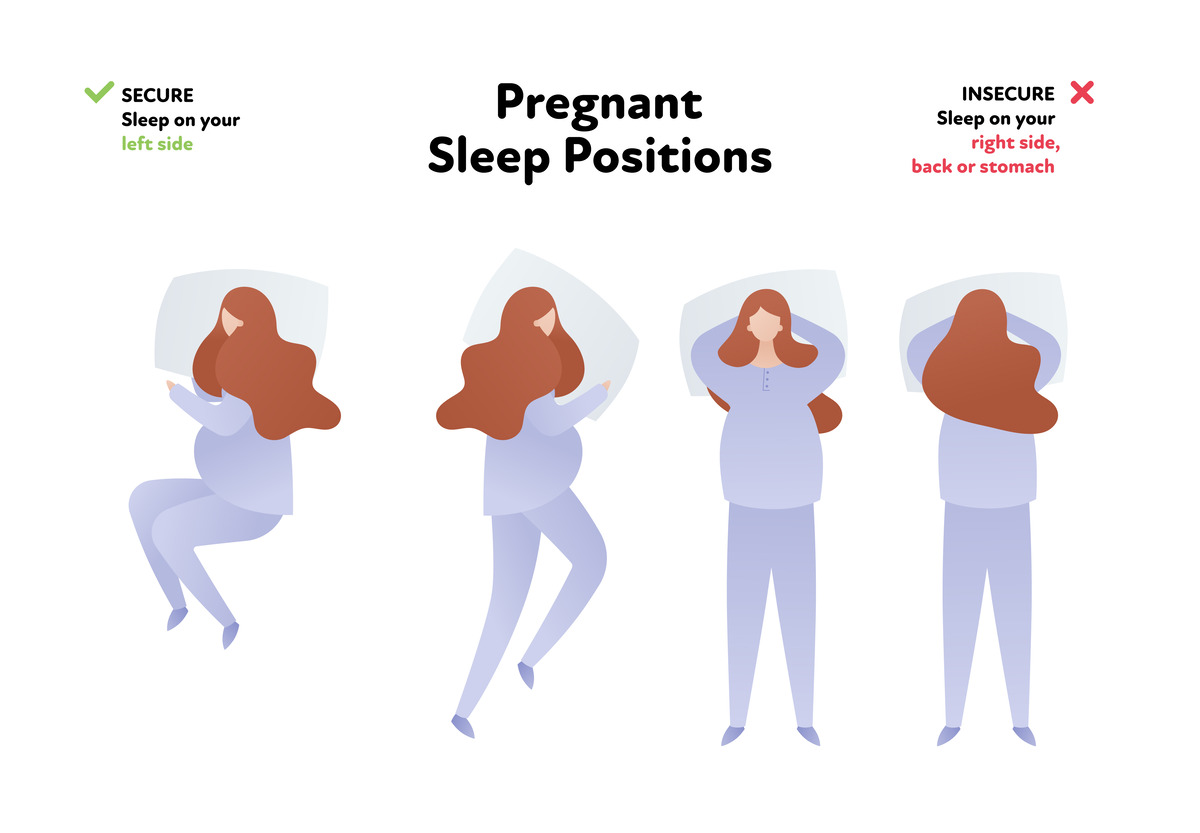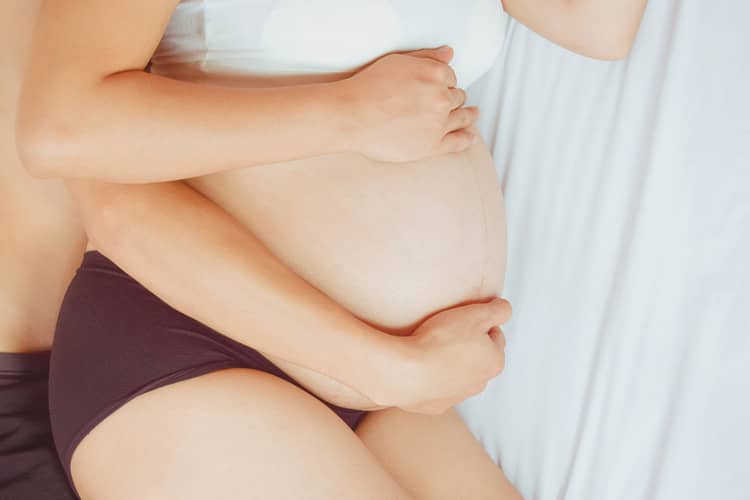
Sleeping on your stomach or lying on your back during pregnancy
Sleep problems are more than common during pregnancy. Allegedly, at least 50% of pregnant women have problems with insomnia, the reasons being ongoing physiological and hormonal changes, anxiety and stress. With a growing belly, it is problematic to find a suitable, or comfortable sleeping position. Moreover, if a woman also falls asleep, especially in the later stages of pregnancy, she is forced to get up several times during the night because she has a full bladder.
Adequate sleep is extremely important during pregnancy. A woman is tired after the whole day, and sleep can give her energy and strengthen her health. Many factors affect the quality of sleep, some of which you can influence and thus treat yourself to a well-deserved rest. Correct sleeping positions during pregnancy are also essential. Is lying on the back or sleeping on the stomach during pregnancy suitable?
Sleeping positions during pregnancy
During pregnancy, the most common sleep disorders are restless legs syndrome, sleep apnea, and gastroesophageal reflux. When falling asleep, women may have an irresistible urge to move their legs, they are troubled by heartburn, which causes an unpleasant burning sensation in the esophagus especially when lying down, and weight gain together with a stuffy nose can lead to snoring and sleep apnea, which disrupt the quality of sleep. How to sleep during pregnancy to limit sleep problems? The sleeping positions to which they were accustomed until then do not suit most pregnant women. During pregnancy, suitable sleeping positions can change, mainly due to the growing belly.

Side sleeping position
According to several studies and also many mothers, this is the most suitable sleeping position not only during pregnancy. The position on the side has a positive effect on the quality of sleep, especially if the expectant mother suffers from snoring. Sleeping on the left side is especially recommended, in this position the fetus is more efficiently supplied with blood and nutrients reach the baby better through the placenta. In the side position, the kidneys are relieved, which makes it easier for toxins to be removed from the body. It is, of course, advisable to alternate sides during sleep - change the left and right sides/hips.
While sleeping on your side, you should not have your head too high so that your back is in a straight position. The use of an anatomical pillow is suitable. If your back hurts, you can put a pillow under your stomach, slightly bend your legs and place the pillow between your legs. A suitable choice in this case is a pregnancy pillow.
If you prefer the position on your back, but it is no longer suitable for you, you can try the "half position" between sleeping on your back and on your side. Lie on your side and back and support your bottom with a pillow, duvet or soft mattress that you can lean against and sleep on your side and back.

Lying on your back during pregnancy
At the beginning of pregnancy, this position does not matter, over time, snoring and back pain could occur because the uterus starts to press on it. The position on the back is one of the most unsuitable positions for sleeping, especially in the 3rd trimester. The weight of the uterus in this phase of pregnancy presses on the back and on the lower vena cava, causes muscle pain and blood circulation disorders, hemorrhoids are not unusual either. This adversely affects the quality of sleep. Sleeping on your back can cause a feeling of nausea and can lead to a drop in blood pressure. Avoid lying in this position for a long time, if you choose it, support your right knee with a pillow, it will be more comfortable.

Sleeping on your stomach during pregnancy
A less suitable sleeping position during pregnancy is also the stomach position. At the beginning of pregnancy, sleeping on your stomach is fine, then you can sleep in any position. The fruit is small and will adapt to any position you choose. When the dimensions and weight of the baby increase, sleeping on the stomach will no longer be pleasant or even possible. From approximately the end of the 2nd trimester, sleeping on the stomach is not recommended, as it could injure the fetus.
Tips for good sleep during pregnancy
From the 1st trimester, fluctuating hormone levels can have an adverse effect on falling asleep. Nausea, vomiting, breast tenderness, shortness of breath, frequent urination at night, leg cramps or increased heart rate prevent a comfortable sleep. Back pain gradually appears, the growing belly prevents finding a suitable position for rest. Quality sleep is important for both mother and child, sleepless nights lead to fatigue and sleepiness, affect the immune system, affect blood sugar regulation, which can lead to gestational diabetes. In addition to adjusting the sleeping position, sleep problems during pregnancy can be alleviated with the help of sleep hygiene.
- Drinking regime: You should drink about 2 liters of water a day. It is best to drink most of it during the day and to reduce fluid intake before going to bed. In this way, you minimize nighttime urination and the need to get out of bed for it.
- Exercise: Thanks to regular exercise, you will improve blood circulation and reduce leg cramps, improve your overall health and reduce back pain. All this will lead to improved sleep. Avoid exercising in the evening, increased adrenaline could, on the contrary, be the cause of insomnia.
- Stress: Stress and anxiety related to the arrival of the baby have an adverse effect on your sleep. Try writing down your fears, maybe they won't seem so threatening. Talk to your partner, friend, mother, or a professional about your concerns, it will help you gain perspective.
- Sleep during the day: You can more easily achieve the recommended minimum of 8 hours of sleep per day if you allow yourself to rest during the day as well. Take an hour's sleep to prevent fatigue.
- Regimen: A pregnancy routine can help with sleep problems. Regular bedtime rituals will help you relax and fall asleep more easily. Read a good book, take a warm shower, a cup of herbal tea or ask your partner for a massage.
- A quality mattress: A good mattress is necessary for a good night's sleep. During pregnancy, foam mattresses are the most suitable because, thanks to their high elasticity, they can adapt to the body and it does not interfere when you gain weight and subsequently lose a few kilos.
- Pillows: Try to be comfortable while sleeping, extra pillows will help you with this. When sleeping on your side, it is advisable to have a pillow under your head, under your stomach and under your knee. You can also support your growing belly with a pregnancy pillow.
- Eating: Resist pregnancy cravings especially in the evening, it's harder to fall asleep with a full stomach. Avoid caffeine altogether, avoid spicy, fried and acidic foods (they can cause heartburn). Eat a balanced diet, small portions more often throughout the day.
- Bed only for sleep: The bedroom should be associated with sleep and moments with your partner, if you work and eat in bed, it can negatively affect your sleep.
- Don't try to fall asleep by force: If you can't fall asleep within, say, half an hour, it's better to get out of bed and go to the next room to read, knit or paint. Engage in an activity that won't take up much of your time, but will take your mind off of the fact that you can't fall asleep. After 15 minutes, try to fall asleep again.

How to sleep during pregnancy - experience
Many mothers shared their experiences with the correct sleeping position during pregnancy in discussions. They recommend sleeping especially on your left side or semi-lying, semi-sitting on your back, but you don't have to avoid lying on your stomach or on your back either, but only until the 2nd trimester. In the 3rd trimester, sleeping on the stomach or back is no longer suitable, as it endangers the fetus. In the supine position, the child can press on the vena cava, disrupt blood flow and cause dizziness.
The most frequent questions - FAQ
Pregnancy is rarely a time for quality sleep – a growing belly, heartburn, lower back pain, stress and worry have an adverse effect on sleep. Correct sleeping position and sleep hygiene have a positive effect on sleep. Did you not learn everything you were looking for in the article? Ask us in the comments what interests you. We will reply as soon as possible.
Why are sleeping positions important during pregnancy?
Do I need a pregnancy pillow for sleeping?
How to sleep during pregnancy?
Pridať komentár





